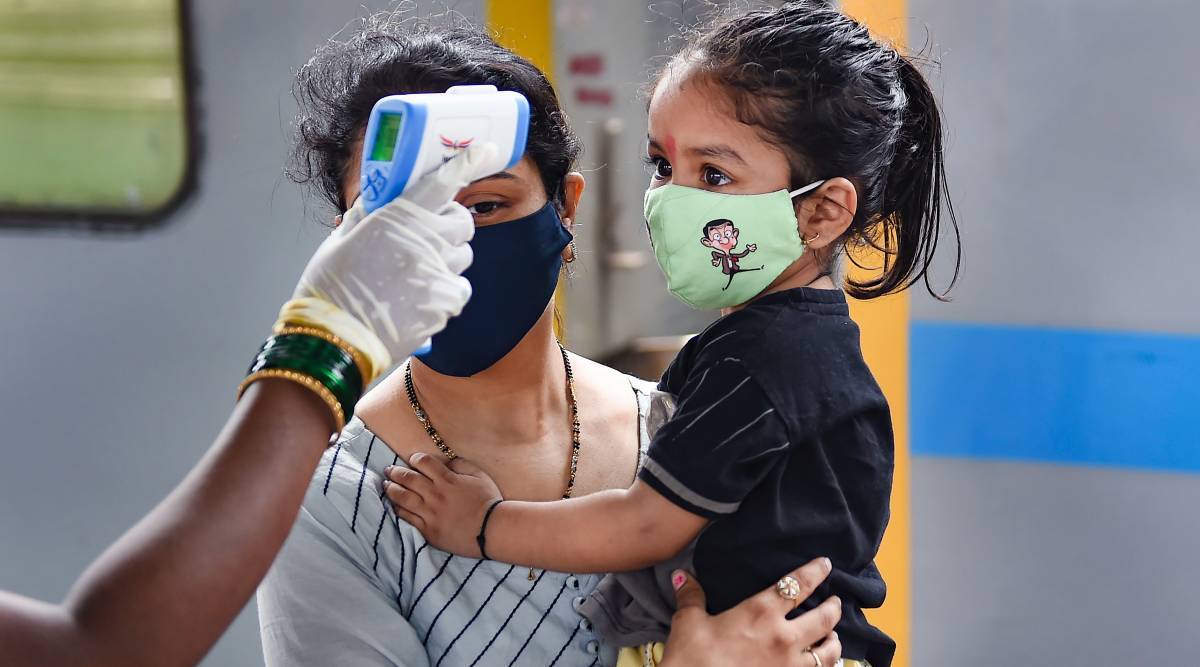 A healthcare worker takes the temperature of a child amid the Covid-19 pandemic. (File photo)
A healthcare worker takes the temperature of a child amid the Covid-19 pandemic. (File photo) The possible impact of the COVID‐19 pandemic on children is a growing concern. There are fears that the new mutant could infect children, though medical experts have cautioned against such alarmist predictions.
School closures have not only affected children’s mental well-being and holistic development, but have also added to parents’ responsibilities, who are now dealing with the additional task of assisting their children with online classes. These are stressful times for parents as they have to balance personal life, work, and raising children. There is added pressure on parents and caregivers who have lost their livelihood due to the pandemic.
Then there are families that are severely affected by the disease — families where one or both parents had to quarantine themselves, leaving children to cope on their own; many families lost their loved ones to Covid-19.
In such stressful situations, parenting becomes even more challenging as it is difficult to fulfil basic needs of young children such as nutrition and education. High levels of stress can impair their ability to be supportive caregivers, critical for children’s mental health.
Prolonged lack of access to education, health, and social services can affect the growth and development of young children, especially those living in vulnerable conditions. The environment that we provide to a child in her first six years plays an important role in her cognitive and emotional development. These are foundation years for children and a safe and happy childhood is extremely important for children to make the most of their abilities and talents as they grow.
According to Bal Swaraj, an online tracking portal devised by the National Commission for Protection of Child Rights (NCPCR), as many as 9,346 children (as of May 29, 2021) between age 0-17 have been affected by Covid-19, 7,464 lost one parent, 1,742 were orphaned, and 140 abandoned since March 2020. Studies have revealed that children who lose their parents at an early age are more susceptible to psychological trauma and depression. Losing one or both parents can also affect their school performance.
It is imperative to pay special attention to ensure the mental well-being of parents since it is directly linked to the growth of a child. Sensitisation of parents on necessary skills to ensure a safe and enabling growth environment for children should be prioritised. As parents have to ensure the mental well-being of themselves as well as their children, a widespread psychological first-aid training will go a long way towards helping them deal with unprecedented levels of stress. Self-regulation of fear and anxiety is also vital for parents. As a father of two young children, I can say that children observe and adapt fast. It becomes even more important for parents and caregivers to use optimistic words while emoting their feelings. UNICEF suggests that children need reassurances from parents that illness because of Covid-19 is treatable; it is important for parents and caregivers to be calm. Listen to your children, take some time out for them, follow a routine. These small measures can be helpful to keep a child happy.
Children’s mental health should form an essential component of public health interventions during the pandemic. Available mental health resources must reach out to children in distress through community‐based services (or schools if possible). Central and state governments should take more actions to support parents in sharing the extra burden in terms of providing resources to their children, particularly in rural areas, and to the underserved families. The Ministry of Social Justice and Empowerment’s 24×7 toll-free mental health rehabilitation helpline KIRAN (1800-599-0019), which aims to provide the first line of counselling in response to the increasing mental health issues among people due to the Covid-19 pandemic, needs to be widely publicised.
The positive relationship between parents/caregivers and children in the initial years of a child’s life is a driver of their wellbeing throughout their lives. This can only be attained if we as parents take care of our emotional wellbeing and engage more with our children. In India, the stigma attached to mental health issues is strong — limited access and availability of mental health services, coupled with stigma, might leave many parents vulnerable, which in turn will affect children in the long‐term.
The government must take appropriate steps to mitigate the brewing mental health crisis because of the pandemic. Businesses can promote family-friendly policies such as including paid parental leave, access to affordable and quality childcare etc. The initiatives must be inclusive and extended to all the employees of a business regardless of gender and employment status. The pandemic is an opportunity to revisit our existing policies, programmes and institutions and devise a new approach towards the holistic development of children.
The writer is a Member of Parliament
- The Indian Express website has been rated GREEN for its credibility and trustworthiness by Newsguard, a global service that rates news sources for their journalistic standards.

